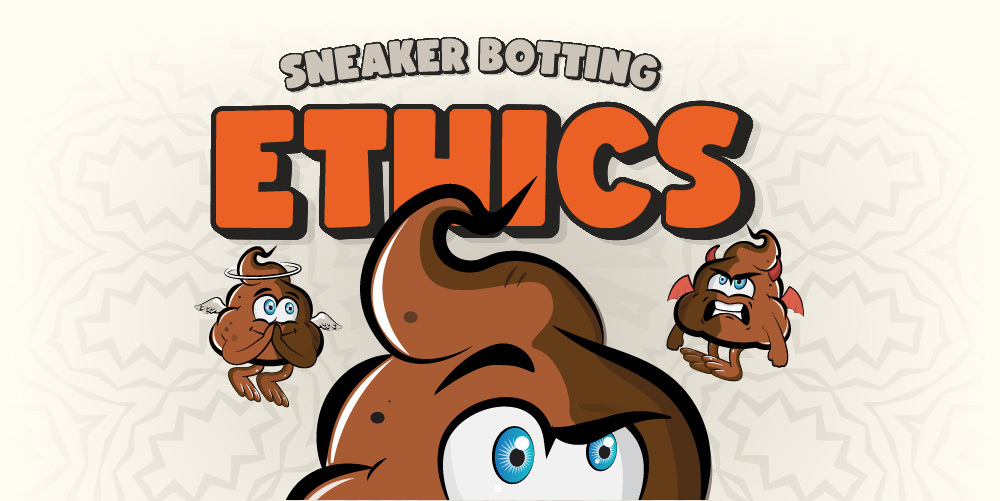Sneaker Botting Ethics: A Journey from Origins to Dilemmas
To comprehend sneaker botting ethics, it’s important to first understand how it all started and how it’s currently moving. So let’s step into the world of sneaker reselling—an exploding industry brimming with potential and controversy, as we delve into the ethical dilemmas this community faces. On one hand, it’s an opportunity for enthusiasts to gather an impressive collection or make a significant profit. On the other hand, it promotes selectiveness, often putting designer sneakers out of reach of die-hard fans. A game that’s both thrilling and cutthroat at the same time, let’s lace up and uncover its truth.

A Walk Down Sneaker Botting Memory Lane
Let’s first get a little history lesson of where the sneaker reselling market all began.
We can all agree that the rise of sneaker culture started with the emergence of basketball legends like Michael Jordan and the influence of Hip-Hop culture. That’s when iconic sneakers, particularly those produced by brands like Nike and Adidas, gained immense popularity.
Next, brands began producing limited-edition collabs with celebrities. This Limited availability fueled demand and drove enthusiasts to seek exclusivity with their sneakers.
After that, in the early 2000s, we began witnessing the rise of eBay. eBay provided a more organized secondary market for sneakers.
Then comes social media. The introduction of Instagram and Twitter gave enthusiasts wide-open platforms to showcase their collections and any new release information.
More and more people became aware and wanted to be part of the sneaker community. Which led us to automation and sneaker bots. As fans raised the demand for limited-edition releases, the difficulty of manually acquiring them increased. The solution? We created sneaker bots. These bots sparked controversy as they gave certain individuals an advantage over manual buyers. (Find bots for sale here.)
After automation caused the market to explode, StockX and GOAT came in the mid-2010s to revolutionize the industry by introducing a stock market-like model. They gave buyers transparency in pricing, authenticated products, and created a more standardized marketplace for both buyers and sellers.
Today, we have hundreds of sellers who’ve turned sneakers into their full-time jobs, with a lot of their profits depending on high-profile collaborations and celebrity favors to further elevate the value of certain sneaker releases.
Now, the industry is facing challenges, including issues with counterfeit products (learn to spot them), ethical concerns surrounding sneaker bots’ legitimacy, and debates about the impact of botting on genuine sneaker enthusiasts. Let’s explore some of the most prominent ethical concerns.
Unraveling the Quandaries of Sneaker Botting Ethics
As we delve deeper into the sneaker reselling market, it’s impossible not to question the fairness of this practice. Let’s examine three main ethical questions that sum up the moral dilemma surrounding it.
Is it Fair to Profit from Sneaker Reselling?
The first major ethical question revolves around equitableness. Is it fair for resellers to profit from selling sneakers at a significantly higher price?
The question of fairness here is quite subjective and dependent on whether or not you’re a botter yourself. On one hand, resellers argue that their business stands on the principles of supply and demand. Others argue that limited supply and sky-high prices manipulate the system and put the average consumer (and die-hard fans) at an unfair disadvantage.
Should Brands Limit Sneaker Purchases?
Another pressing ethical question asks: Should brands impose stricter purchase limits to prevent bulk buying? Bulk buying practice is often linked with reselling, as it enables resellers to monopolize supply. However, identifying a suitable limit per customer is a complex process, and may potentially result in unwarranted discrimination. Besides, sneaker bots have already found a solution for that. TSB users would know! 😉
Can Technology Trim Unfair Practices?
The last question to ponder is: Can technology be utilized to curb unfair practices in the sneaker reselling market? Some argue that technology itself could be used to level the buying field. through measures such as anti-bot technologies, blockchain for authentication, raffle systems, AI for fraud detection, and collaboration with law enforcement. However, creating a foolproof system can be challenging and will always need ongoing efforts to stay ahead of the ever-evolving tactics.
Wrapping Up the Sneaker Botting Ethics Dilemma
Ultimately, whether it is considered fair or not depends on one’s values and perspective. Some may see it as a legitimate business, while others view it as taking advantage of market inefficiencies at the expense of genuine enthusiasts. The ethical considerations of sneaker reselling continue to be a topic of debate within the sneaker community and beyond.
Whether or not we can find a balance between the interests of resellers and those of consumers, we’ll all have to stay tuned.
